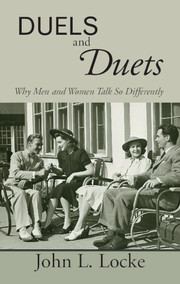Crossref Citations
This Book has been
cited by the following publications. This list is generated based on data provided by Crossref.
2012.
Books and Films Received.
Current Anthropology,
Vol. 53,
Issue. 2,
p.
252.
2012.
PUBLICATIONS RECEIVED.
Language in Society,
Vol. 41,
Issue. 2,
p.
289.
McKeown, Gary J.
2013.
The Analogical Peacock Hypothesis: The Sexual Selection of Mind-Reading and Relational Cognition in Human Communication.
Review of General Psychology,
Vol. 17,
Issue. 3,
p.
267.
Fidaoui, Diana
and
Bahous, Rima
2013.
Men's talk in a Lebanese shisha café.
Journal of Multicultural Discourses,
Vol. 8,
Issue. 1,
p.
48.
Queen, Robin
2013.
The Handbook of Language Variation and Change.
p.
368.
Freed, Alice F.
2014.
The Handbook of Language, Gender, and Sexuality.
p.
625.
Cameron, Deborah
2015.
Evolution, Language and the Battle of the Sexes.
Australian Feminist Studies,
Vol. 30,
Issue. 86,
p.
351.
Wilson, John
and
Boxer, Diana
2015.
Discourse, Politics and Women as Global Leaders.
Vol. 63,
Issue. ,
p.
345.
Chen, Daniel
Halberstam, Yosh
Yu, Alan C. L.
and
Stephen, Ian D.
2016.
Perceived Masculinity Predicts U.S. Supreme Court Outcomes.
PLOS ONE,
Vol. 11,
Issue. 10,
p.
e0164324.
Chen, Daniel L.
Halberstam, Yosh
and
Yu, Alan
2016.
Perceived Masculinity Predicts U.S. Supreme Court Outcomes.
SSRN Electronic Journal ,
Jeynes, William H.
2016.
Meta-Analysis on the Roles of Fathers in Parenting: Are They Unique?.
Marriage & Family Review,
Vol. 52,
Issue. 7,
p.
665.
McKeown, Gary
2017.
Distributed, Ambient and Pervasive Interactions.
Vol. 10291,
Issue. ,
p.
627.
Chen, Daniel L.
Halberstam, Yosh
and
Yu, Alan
2017.
Covering: Mutable Characteristics and Perceptions of Voice in the U.S. Supreme Court.
SSRN Electronic Journal,
Meng, Lingzi
2019.
Gender in Literary Translation.
Vol. 3,
Issue. ,
p.
1.
Silverio, Sergio A.
2019.
The Bright Side of Shame.
p.
149.
Locke, John L.
2021.
The Indexical Voice: Communication of Personal States and Traits in Humans and Other Primates.
Frontiers in Psychology,
Vol. 12,
Issue. ,
Benenson, Joyce F.
Webb, Christine E.
and
Wrangham, Richard W.
2022.
Self-protection as an adaptive female strategy.
Behavioral and Brain Sciences,
Vol. 45,
Issue. ,
Benenson, Joyce F.
2022.
Human Females as a Dispersal-Egalitarian Species: A Hypothesis about Women and Status.
Adaptive Human Behavior and Physiology,
Vol. 8,
Issue. 4,
p.
433.
An, Yi
Su, Hang
and
Xiang, Mingyou
2022.
Apology responses and gender differences in spoken British English.
Pragmatics. Quarterly Publication of the International Pragmatics Association (IPrA),
Vol. 32,
Issue. 1,
p.
28.
Benenson, Joyce F.
and
Markovits, Henry
2023.
Levelling as a Female-Biased Competitive Tactic.
Evolutionary Psychological Science,
Vol. 9,
Issue. 2,
p.
270.





